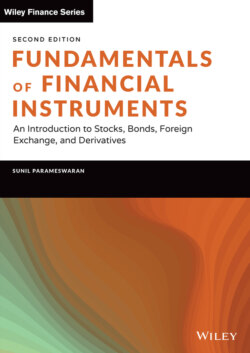Читать книгу Fundamentals of Financial Instruments - Sunil K. Parameswaran - Страница 42
На сайте Литреса книга снята с продажи.
BROKERS AND DEALERS
ОглавлениеA broker is an intermediary who arranges trades for clients by helping them to locate suitable counterparties. The broker's compensation is in the form of a commission paid by the client. Brokers do not finance the transaction, in the sense that they do not carry an inventory of the asset(s) being sought. They are merely facilitators of the trade, who receive a processing fee for the services rendered. Brokers are very common in real estate markets. For instance, if we were to contemplate the purchase of a house, we would approach a realtor, who will have a list of properties whose owners have evinced interest in selling. Realtors do not own an inventory of houses they have financed.
A dealer, on the other hand, is a market intermediary who carries an inventory of the asset in which he is making a market. Thus, unlike a broker, a dealer has funds locked up in the asset. Effectively, a dealer takes over the trading problem of the client. If the client is seeking to sell, the dealer will buy the asset from them in anticipation of the latter's ability to resell it subsequently at a higher price. Similarly, when a client wishes to buy the asset, the dealer will sell the asset from their inventory in the hope of being able to replenish their stock subsequently at a lower price. Thus, in order to ensure profits from trading activities, a dealer has to be a master of the art of trading. In developed countries, dealers will usually specialize in narrow segments of the securities market. That is, some will handle Treasury bonds, while others may choose to specialize in municipal debt securities. This is because, considering the volumes of transactions, skill is of the essence, and even small errors could lead to huge losses, given the magnitude of the deals.
How do dealers make money? Obviously, the price they quote for acquiring an asset will be less than the price at which they hope to sell to another party. The price at which a dealer is willing to buy from a client is called the bid and the price at which the dealer is willing to sell to a client is called the ask. The difference between the bid and the ask is called the bid–ask spread, or quite simply the spread. Dealers seek to make money by rapidly rotating their inventories. A purchase at the bid followed by a subsequent sale at the ask will result in a profit equal to the spread. Such a transaction is termed as a round-trip transaction. Dealers doing many round-trip transactions can survive on a lower spread. However, if transactions are few and far between, then the spreads will be high. In other words, if the volumes are high, then margins can be low. However, if the volumes are low, then the margins need to be high.
Many dealers don the mantle of both brokers and dealers. Thus, in certain transactions they will act as trade facilitators who provide services in anticipation of a commission, while in other cases they will position themselves on one side of the trade, by either buying or selling securities. Such dealers are called dual traders. A transaction where the dealer functions merely as a broker is referred to as an agency trade. However, a trade where the dealer is one of the parties to the transaction is termed as a proprietary trade.
Dealers who undertake to provide continuous two-way price quotes are referred to as market makers. Their role is to create a liquid secondary market. On the New York Stock Exchange (NYSE) there is only one market maker for a security. However, one dealer may make a market in multiple securities. This monopolist market maker is referred to as a specialist, and is also known as an assigned dealer because that role has been assigned by the exchange. When a company seeks to list its securities on the exchange, a number of potential market makers will express their desire to act as the specialist for the stock being introduced. They will be interviewed by representatives of the company as well as the exchange, and finally one of them will be selected as the specialist for that particular stock. There are also interdealer brokers who act as intermediaries for trades between market makers.
